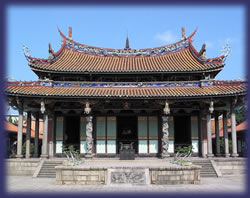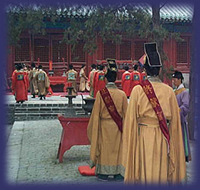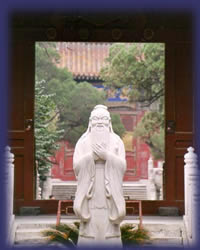
Confucian temple, Taiwan
“When
the Master went inside the Grand Temple, he asked questions about everything.
Someone remarked, ‘Who said that [Confucius] understood the rites?....’
The Master, on hearing of this, said, ‘The
asking of questions is in itself the
correct rite.’”
Analects III.15

Reenactment of Confucian ritual
...When
he bowed to his colleagues, stretching out his hands to the left or to
the right, his robes followed his movements without being disarranged.
He went forward with quickened steps,
as
though he was gliding on wings....
Analects,
X.1
The religion of Confucius’s day was based partly on the idea of li [17]. Generally, this term refers to sacrifice and formal rituals—whether the offical rites of the state or domestic rituals, such as sang li, ‘funeral rites’. In some contexts it also refers to rules of proper conduct [18] and in others it can be translated simply as ‘morality’ or ‘religion’. The Chinese knew that the pagentry and music of ceremonies had a strong civilising influence and that participation in the rites could promote social cohesion—a belief Confucius shared, notwithstanding the quote on the left. [19]
In honour of this, in some places his birthday is celebrated with traditional music and ancient ceremonial dances. This would undoubtedly please him, as even as a child he showed an interest in ritual. [20] He found great satisfaction in taking part in these occasions; it is also clear from the Analects that he frequently used references to li as a metaphor for embodying the sacred in everything one does, however humble the event.
For
Confucius, li was not so much a matter of performing a ritual
according to an intricate set of rules, but rather an attitude—the
spirit in which the rites were performed. He strongly believed
that this attitude should not be confined to the temple but rather extended
into all aspects of behaviour: “Unless a [person] has the spirit
of the rites, in being respectful [they] will wear themselves out, in
being careful [they] will become timid, in having courage [they] will
become unruly, and in being forthright [they] will become intolerent.”
Acknowledging that laws and punishments were capable of keeping order,
he insisted that government by right behaviour (li) was better,
as it encouraged individuals by example rather than controlling by coercion.
“The
topics the Master did not speak of were prodigies, force, disorder and
gods.”
Analects XX.3

Confucian temple, Beijing
A temple was erected in honour of Confucius a year after his death, the sacrifices made to him part of a larger system of established cultic rituals. As his ideas were spread and developed by his followers, temples were built all over China. It is somewhat ironic that the man who refused to talk about gods would eventually come to be worshipped as one.
Until
you are able to serve [your fellow humans]
how
can you serve spiritual being? Until you know about
life,
how can you know about death?
Analects,
XI.12
The early Zhou kings had justified their overthrow of the Shang dynasty (c 1122 BCE) by proclaiming that they had been given a heavenly mandate (tian ming) to restore peace and prosperity. By Confucius’s time, the idea of an all-powerful god [21] had given place to a depersonalised heavenly force (tian), to which Confucius clearly felt connected. Although he was not primarily a religious teacher, he believed that a person’s virtue or inate power (de [22]) came from Heaven (Tian), and that he himself had a responsibilty to fulfil his own heavenly-appointed destiny.
His contribution to political thought was his insistence on the identification of ethics with politics. He believed that government was not simply the manipulation of power, but rather a matter of moral responsibility. If the ruler governed in a righteous manner all others would follow his example: “The rule of virtue (de) can be compared to the Pole Star which commands the homage of the multitude of stars without leaving is place.” [23]
He extended the term zhun zi [24]—referring to a person of noble birth—to anyone who exhibited true nobility. The moral attribute he seemed to value more than all others was ren, a character that has been variously translated as love, goodness, benevolence, human-heartedness and kindness.
From everything that was recorded about him, it is clear that he didn’t care about a person’s beliefs as long as they behaved well towards their fellow human beings. Centuries before Jesus he was teaching the golden rule: “Do not impose on others what you yourself do not desire.” [25] Although it has gone through many ups and downs, Confucianism today remains true to the man, a practical philosophy that aims to establish a better world order by means of the moral enrichment of individuals.